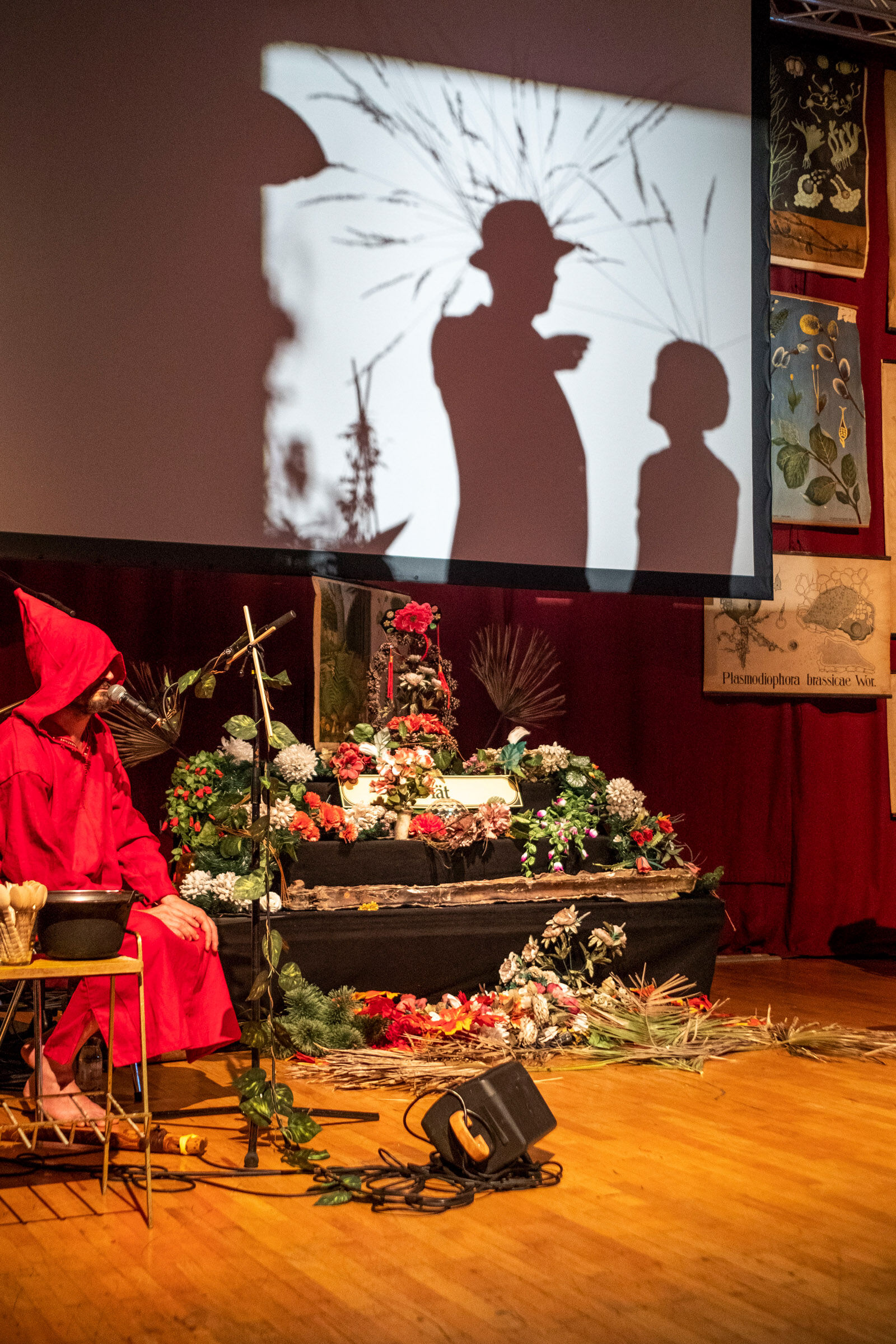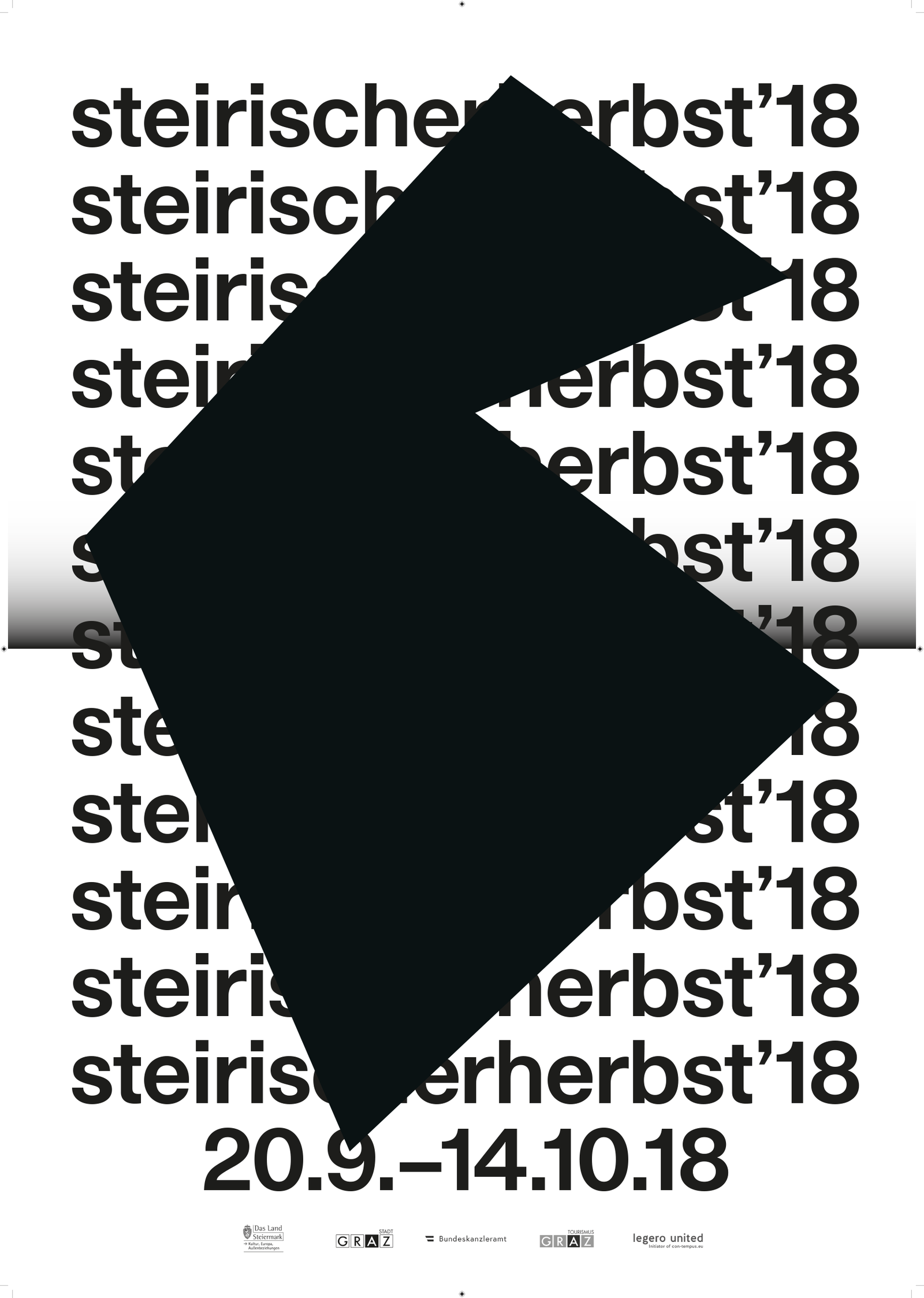2018

Bread and Puppet Theater, The Underneath the Above Parade #1 (2018), performance, Europaplatz, Graz, 2018, photo: Mathias Völzke; courtesy of the artists

Yoshinori Niwa, Withdrawing Adolf Hitler from a Private Space (2018), installation view, Hauptplatz, Graz, 2018, photo: Mathias Völzke; © Bildrecht, Wien 2021

ZIP group, Aurora (2018), installation view, AK Steiermark Volkshochschule, Graz, 2018, photo: Liz Eve; courtesy of the artists

Funda Gül Özcan, es ist eingetreten was zu erwarten war (2018), installation view, Former Ankara Türkü Bar, Graz, 2018, photo: Mathias Völzke

Igor & Ivan Buharov, Örök szándékmező hangolás (Eternal Intentionfield Tuning) (2018), installation and performance, Volkshaus Graz, 2018, photo: Mathias Völzke
steirischer herbst ’18
Volksfronten
Director
Ekaterina Degot
Festival dates
20.9.–14.10.2018
Curatorial team
Director and Chief Curator
Ekaterina Degot
Deputy Director
Henriette Gallus
Head of Curatorial Affairs
Christoph Platz
Curators
Övül Ö. Durmusoglu
Katalin Erdödi
Dominik Müller
Curator for Discourse
David Riff
Assistant Curators
Birgit Pelzmann
Johanna Rainer
General Advisor
Georg Schöllhammer

“The core program of this year´s steirischer herbst is called Volksfronten. The title—deliberately kept in German and in the plural—is as disturbing as it is ambivalent. Many a visitor, and not just German-speaking ones, will scowl, if not shiver, at the sight of ‘Volk,’ stirring up, as it does, the darkest memories. Allegedly innocent, this word marks the slow, early 20th-century shift, in Germany and Austria, from the civic understanding of the notion of ‘people’ to its purely ethnic and racial iteration, which facilitated and propagandized the advent of nationalism and fascism. …
steirischer herbst’s main project this year, curated by the festival team, explores these issues through what can be understood and experienced as a single expanded exhibition spread through town and over many venues. Some of its elements are installations, others performances, and others still symposia or panel discussions—under the overall title Ideas— all specific to the larger parcours in time and space.
There is a decisive focus on Graz’s locality, shaped and overwritten by a troubling, partially-repressed history.”
—guidebook
With Volksfronten (Popular Fronts)—an unsettling and ambivalent title that connotes both left-wing, anti-fascist alliances and the nationalistically appropriated term Volk, was intentionally written in the plural form and always in German—the first steirischer herbst under Ekaterina Degot reacted to a climate increasingly being poisoned by right-wing populism, nationalistic sentiments, racial or ethnic segregation, and media manipulation. She wrote in her preface to the guidebook, “In our current time, all over the world, the state propaganda machine, rising xenophobia, anti-refugee politics, and the complicity of the ‘entitled’ population in those structures that maintain its privileges offer astonishing and alarming déjà vus of the 1930s.”
Untypically, the opening took place on the left bank of the Mur River at the perhaps most public place in Graz, on Europaplatz in front of the central railway station—in the open air and accessible to all. In her speech, the artistic director asked random passersby rhetorical questions, ranging from “Excuse me, could you tell me where the tram station is?” to “Pardon, but are you interested in contemporary art?” to “Excuse me, are you for or against immigration?” or “Might I ask a question: Do you hoard Nazi memorabilia in your home?”
The legendary New York-based Bread & Puppet Theater then led a public parade along Keplerstraße to Mariahilferplatz—a spectacle very much in line with the progressive populism under which Degot positioned her tenure as artistic director as a whole. On the opposite, right side of the Mur, Roman Osminkin staged his first open-air performance, Putsch (After D. A. Prigov), on the stairs to the Schloßberg (in common parlance the “Russian Stairs”), followed by Laibach’s Sound of Music on the Kassematten stage, a new presentation of the well-known musical and Hollywood film that associates the Alpine ideal, and its forgetting of history, with North Korea.
The festival parcours continued at historically significant public places throughout the city, in site-specific works by Rossella Biscotti and Kevin van Braak on the public square Am Eisernen Tor, Igor & Ivan Buharov at the Volkshaus Graz, which steirischer herbst used for the first time, Henrike Naumann at the Haus der Architektur, Yoshinori Niwa on Hauptplatz (with a container for disposing of Nazi memorabilia), Funda Gül Özcan at the former Ankara Türkü Bar on Griesgasse, and Milica Tomić at the Forum Stadtpark (with archeological research work on a concentration camp in southern Styria).
There were also plays by Michael Portnoy and Roee Rosen at Orpheum, as well as Ivan Vyrypaev’s The Iran Conferenceat the University of Graz. The Russian ZIP Group installed a monumental sculpture with the slogan of the Yugoslavian partisans, “Death to fascism, freedom to the people!” on the roof of the Chamber of Labor, and the Theater im Bahnhof (a self-proclaimed “Volkstheater” collective) invited visitors on a taxi choreography through Graz, in which the drivers staged their own tours through the city and took visitors to the infamous Pascha nightclub, among other places.
Our Little Fascisms was the title of a series of interviews and discussions with Ewa Majewska and Ishay Landa, among others, that took place over two days at Orpheum, and the Symposium on Photography XXI, organized by Camera Austria, investigated the Gewalt der Bilder (Violence of Images). The two events and other thematic evenings were part of the “Ideas” section, with free admission. musikprotokoll, directed by Elke Tschaikner in 2018, took place independently of the core program and included contributions by ZULI, Kurt Hentschläger, and the Klangforum Wien, among others.
Program
Volksfronten
Michael Zinganel & Michael Hieslmair
Rossella Biscotti & Kevin van Braak
kozek hörlonski in collaboration with Alexander Martinz
Martin Behr & Martin Osterider
Roee Rosen with Hani Furstenberg and Igor Krutogolov’s Toy Orchestra
Ideas
Collateral Program
Künstlerhaus, Halle für Kunst & Medien
< rotor > center for contemporary art
Festival opening
20.09., 17:00
Europaplatz - Keplerstraße - Mariahilferplatz
Bread & Puppet Theater, The Underneath the Above Parade #1
19:30
Schloßbergplatz, Schloßbergstiege
Roman Osminkin, Putsch (After D.A. Prigov)
21:00
Schloßbergbühne Kasematten
Laibach, Laibach´s Sound of Music
Venues
Akademie Graz
Am Eisernen Tor
Andreas-Hofer-Platz
Camera Austria
Dom im Berg
Ehemalige Ankara Türkü Bar
Hauptplatz
Haus der Architektur
Helmut List Halle
Hotel Daniel Graz
Hotel Wiesler, Frühling
Karl-Franzens-Universität Graz, Aula (Auditorium)
Karl-Franzens-Universität Graz, Heizhaus
Kulturzentrum bei den Minoriten
Literaturhaus Graz
Orpheum
Orpheum Extra
Schloßbergbühne Kasematten
Schloßbergplatz, Schloßbergstiege
Volkshaus Graz
Volkshochschule Steiermark (Arbeiterkammer, Dach)
esc medien kunst labor
Publications

steirischer herbst festival gmbh, Guide Book steirischer herbst ’18 (Graz: 2018)
→ Available here

Ekaterina Degot and David Riff, Volksfronten. Popular Fronts (Berlin: Hatje Cantz Verlag, 2019)
→ Available here
Retrospective
Retrospective